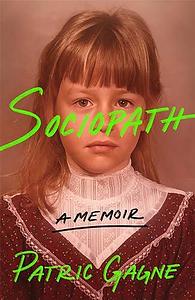You need to sign in or sign up before continuing.
Take a photo of a barcode or cover
dark
reflective
slow-paced
challenging
dark
emotional
informative
reflective
medium-paced
This memoir pulls you into the psyche of someone living with a condition that most people only encounter in sensationalised media portrayals. Patric writes with disarming honesty about her journey from a troubled child to a self-aware adult grappling with sociopathy, creating a narrative that's both deeply personal and unexpectedly educational.
The book succeeds most when it focuses on the day-to-day reality of navigating the world without conventional emotional responses. Her childhood scenes - the compulsive stealing, the inability to feel remorse, the constant sense of otherness - are rendered with vivid clarity. The relationship with her mother becomes this fascinating anchor point, showing how someone tries to provide moral guidance to a child who doesn't naturally understand moral boundaries.
The book traces her intellectual awakening at UCLA, where psychology courses sparked her deeper self-investigation. There's something almost detective-like in how she approaches understanding her own condition, developing behavioral strategies and interrogating why so little research exists on sociopathy.
The writing itself flows well, avoiding both clinical dryness and overwrought emotion. Patric has a talent for making complex psychological concepts accessible while maintaining the intimacy of personal narrative. Her relationship with David threads through the later sections, offering insights into how someone with her condition navigates love and commitment.
But here's where it gets complicated - for someone with a PhD in psychology, there's a curious absence of academic rigor. She positions herself as a sociopath without deeply engaging with the fact that this isn't an officially recognised diagnosis. The lack of exploration into potential causes - trauma, neurodevelopmental factors, environmental influences - feels like a missed opportunity for deeper understanding.
The memoir also sidesteps some uncomfortable questions about privilege. While briefly acknowledged, there's minimal exploration of how being wealthy and white afforded her unique opportunities for self-exploration that others might not have. Her therapy sessions, education, and professional development all required resources many people lack.
Perhaps most frustrating is that she worked as a therapist but offers almost no insight into how her personal experience informed her practice. This feels like a significant gap in a book that could have offered broader insights into the therapeutic relationship and treatment approaches.
The repetition becomes noticeable - the constant refrain of "I'm a sociopath" starts to lose impact. Sometimes the accessibility that makes the book readable also makes it feel shallow, especially when compared to other mental health memoirs that balance personal narrative with deeper research and reflection.
Despite these limitations, the memoir succeeds as a window into a misunderstood condition. Patric’s willingness to share difficult truths about herself - the stalking, manipulation, moments of genuine cruelty - takes considerable courage. Her exploration of how someone can build meaningful relationships without typical emotional responses offers valuable insights for anyone interested in the full spectrum of human psychology.
Graphic: Animal cruelty, Animal death
Moderate: Mental illness, Stalking, Toxic friendship
Minor: Emotional abuse
This memoir focuses heavily on the author's personal journey of self-discovery rather than providing comprehensive information about sociopathy as a clinical condition. Readers looking for scientific or medical insights into antisocial personality disorders might find the approach somewhat limited. The book works best when approached as a personal narrative rather than an educational text about mental health conditions.
The author's relationship with her mother becomes increasingly strained over time, culminating in periods of estrangement that significantly impact her emotional development. Her romantic relationship with David serves as a major testing ground for her ability to maintain long-term emotional connections.
challenging
informative
slow-paced
dark
emotional
funny
hopeful
informative
inspiring
reflective
Is it possible for a memoir about a sociopath to be *too* self indulgent? Bc I felt this one was. I really liked the first half, then I felt like it was getting to be repetitive.
dark
informative
reflective
medium-paced
reflective
medium-paced
I found part one the most compelling, Gagne is a good writer and I found her perspective on her childhood experiences really compelling and insightful. But the later parts started to drag a bit and started to feel a bit silly and/or implausible. I was here for introspection rather than celeb gossip.
informative
reflective
medium-paced
I really enjoyed this. It definitely taught me a lot, potentially, about sociopaths. I say potentially because the narrator says many times that she is a liar, leaving it up to us to decide if she is trustworthy in her telling of her experience. Personally, I felt that a lot of it was genuine, but I also got the sense that all of it was not entirely genuine. Maybe that is just an after effect of attempting to protect identies.
I couldn't make it any further. So boring






